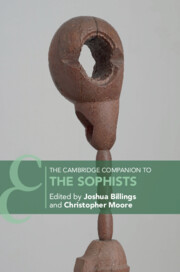Book contents
- The Cambridge Companion to the Sophists
- Other Volumes in the Series of Cambridge Companions
- The Cambridge Companion to the Sophists
- Copyright page
- Contents
- Contributors
- Note on the Text
- Introduction
- Part I Contexts
- Part II Thought
- 5 Nature and Norms
- 6 The Turn to Language
- 7 Problems of Being
- 8 Politics in Theory and Practice
- 9 Interrogating the Gods
- 10 Skills of Argument
- 11 Civic and Anti-Civic Ethics
- Part III Receptions
- Appendix: The People of the Sophistic Period
- Select Bibliography
- Index
- OTHER VOLUMES IN THE SERIES OF CAMBRIDGE COMPANIONS (continued from page ii)
8 - Politics in Theory and Practice
from Part II - Thought
Published online by Cambridge University Press: 23 December 2023
- The Cambridge Companion to the Sophists
- Other Volumes in the Series of Cambridge Companions
- The Cambridge Companion to the Sophists
- Copyright page
- Contents
- Contributors
- Note on the Text
- Introduction
- Part I Contexts
- Part II Thought
- 5 Nature and Norms
- 6 The Turn to Language
- 7 Problems of Being
- 8 Politics in Theory and Practice
- 9 Interrogating the Gods
- 10 Skills of Argument
- 11 Civic and Anti-Civic Ethics
- Part III Receptions
- Appendix: The People of the Sophistic Period
- Select Bibliography
- Index
- OTHER VOLUMES IN THE SERIES OF CAMBRIDGE COMPANIONS (continued from page ii)
Summary
The chapter presents the Sophists’ more original contributions to political thought and shows how some of their ideas, which were often developed in the course of their practice as advisors or pedagogues, influenced the work of the two major philosophers of the next generation, Plato and Aristotle. The chapter’s first section shows the debt of early theorizing on constitutions to the Sophists’ practice of antilogia or debate but also to the discussions about democracy that mark Athenian intellectual life in the last decades of the fifth century, and shows how such theorizing provides the springboard for Plato’s pursuit for the best constitution. Its second section focuses on the criticism of law and argues that (despite what continues to be a dominant interpretation in the study of Sophistic thinking) such criticism should not be understood as a threat to morality but rather as constructive reflection on the nature and the limits of legislation.
- Type
- Chapter
- Information
- The Cambridge Companion to the Sophists , pp. 225 - 250Publisher: Cambridge University PressPrint publication year: 2023
- 1
- Cited by

